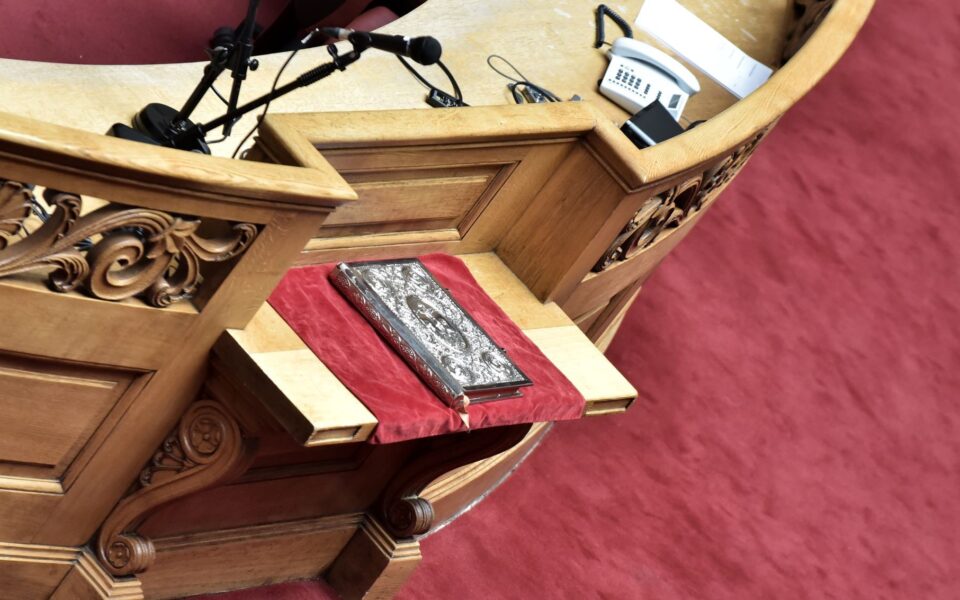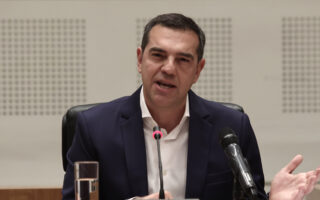New Greek MPs to be sworn in on Monday

The members of Parliament elected in the general elections on June 25 will be sworn in on Monday, in a celebratory opening session commencing at 11 a.m. in the presence of Greek President Katerina Sakellaropoulou.
Nikitas Kaklamanis, the first vice-president of the previous Parliament, will preside over the proceedings, supported by four temporary secretaries who are the youngest MPs from the two parties with the highest number of seats. Kaklamanis will announce the order of the day, present the names of the 300 elected MPs for the Parliamentary records, and read the statements from political party leaders specifying which of the three seats they contested they will retain.
Next, he will request the temporary first secretary of Parliament to accompany Archbishop of Athens and All Greece Ieronymos and a delegation of the Holy Synod into the chamber for the customary blessing ceremony.
Subsequently, Kaklamanis will invite all MPs wishing to swear a religious oath to stand and take the oath specified in Article 59 of the Constitution, in which they pledge loyalty to the country, democratic system of government, obedience to the Constitution and laws, and a conscientious fulfillment of their duties.
Once the ceremony is concluded, the Archbishop will sign the relevant Parliamentary minutes, and the clerical delegation will exit the chamber. Kaklamanis will then ask the Muslim MPs to take the same oath on the Koran, followed by inviting those MPs who prefer to affirm their oath to complete the ceremony.
Prime Minister Kyriakos Mitsotakis and the cabinet members who are also MPs will be sworn in from the ministerial seats.
Afterwards, Kaklamanis will conclude the session, seeking the authorization of the members to ratify the minutes, and then announcing the return of the Parliament on Tuesday for the election of the Parliament speaker.
Before departing, the MPs will sign the protocol of the swearing-in and receive the relevant documents to finalize the process. Sakellaropoulou, upon her arrival, will be greeted by House speaker Konstantinos Tasoulas and will observe the session from the front row of officials’ seats. The other seats will be reserved for any former prime ministers, former Parliament presidents, senior judges, and officials who wish to attend. Additionally, an extra row of seats below the officials’ section will be allocated to representatives from foreign churches, and a number of diplomats and ambassadors have also been invited to join the event.
Election of House speaker
The new Parliament will reconvene on Tuesday for the election of the Parliament president and the presidium, following the proposals of the Parliamentary groups and Parliamentary rules.
Kaklamanis will preside over the beginning of the session, announcing the candidates proposed by the Parliamentary groups. The election will be conducted through a roll-call vote. Ruling New Democracy has nominated the previous Parliament president, Tasoulas. In the first round, the winning candidate must secure an absolute majority of at least 151 votes. If this majority is not achieved, a second round will be held, and the candidate with the highest number of votes will be elected.
Upon announcing the result, Kaklamanis will invite the new Parliament president to take the stand, assume control of the session, and deliver a speech. The Parliament will then briefly adjourn before proceeding to elect the members of the Parliament presidium. Each candidate must receive at least 70 votes to be elected.
Vote of confidence
The new government’s policy statement will be subject to a three-day debate, beginning on Thursday. The debate will culminate in a vote on Saturday, during which the new government will seek a vote of confidence from the Parliament.
The prime minister will initiate the debate, followed by members of the new government, the presidents of the Parliamentary groups, Parliamentary spokespersons, and MPs from all parties.
The vote will be conducted as a roll-call vote held at midnight on the third day of the debate, at the latest. For the vote to pass, an absolute majority of MPs present is required, which cannot, however, be less than two fifths (120 MPs) of the plenum.
[AMNA]





